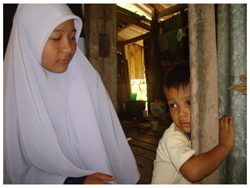A victim of the senseless violence in the far South
 By Waelimoh Pusu
By Waelimoh Pusu
“Abdul Zalam, come get some toys and sweets!”. This gentle voice of invitation came from Dr Petchdao Tohmeena, director of the 15th mental health centre of the Department of Mental Health, when she led a team of psychologists from Pattani-based Crown Prince Maha Vajiralongkorn hospital to visit the boy at his house in Sai Buri district of Pattani.
The five-year old boy was one of the surviving victims of the senseless violence in the far South which has, so far, claimed 4,000 lives since it flared up in January 2004. Abdul Zalam Wama was riding in a motorcycle with his parents and a brother on their way from Ban Jo Bo village in Tambon Paen, Sai Buri district, to visit a relative in Ban Baloh village, Tambon Paseyawo on January 31 when they were attacked by a gunman riding on the pillion of a motorbike.
Firing from a 9 mm semi-automatic pistol at point-blank range, all except the boy were killed at the scene. Slightly injured, Abdul Zalam miraculously survived the brutal attack. The traumatic experience has a lot of impact on the young boy’s mental health which is still being felt today although his condition has gradually improved.
According to the boy’s aunt, Mrs Ropiyoh Arwaebuesa, Abdul has not spoken ever since, especially with strangers. Although his condition has improved, she said the boy often avoids seeing strangers and often hides himself in the house. She, however, said that the boy is now less anxious and not as frightened by strangers as he was a few weeks ago.
Ms Masanee Jeh, chief of the mental health rehabilitation centre at the hospital, said that normally for an adult suffering from similar trauma it would take about three months for the victim to become normal. But in Abdul’s case, it may take longer time, especially in the first three months during which the boy will be closely taken care of, she added.
The mental health therapist said she learned from the boy’s relatives that the victim was normally a quiet boy and the fact that he has not spoken to strangers since the incident might also stem from the boy’s character. However, she admitted that the rehabilitation to heal the boy would take some time because he had witnessed the killing and the incident is still fresh in his memory.
The Crown Prince hospital in Sai Buri now has 69 orphans under its care, 40 plus of whom have experienced trauma which needs rehabilitation. But unlike Abdul who witnessed the murder himself, most of the orphans there did not see their parents murdered.
Dr Petchdao said that officials concerned would try to teach Abdul to adapt himself so that he would be able to carry on with life normally in the future. From her observation, she said that 60 percent of the victims have bad dreams, 30 percent cannot sleep properly, 22 percent are easily frightened and seven percent cannot carry on with their lives.
Abdul’s elder sister, Ms Nuraseeyan, said that the remaining family is yet to receive any financial help from the government. She said that the authorities had blamed insurgents for the death of their parents and brother but police were yet to conclude the murder case.
